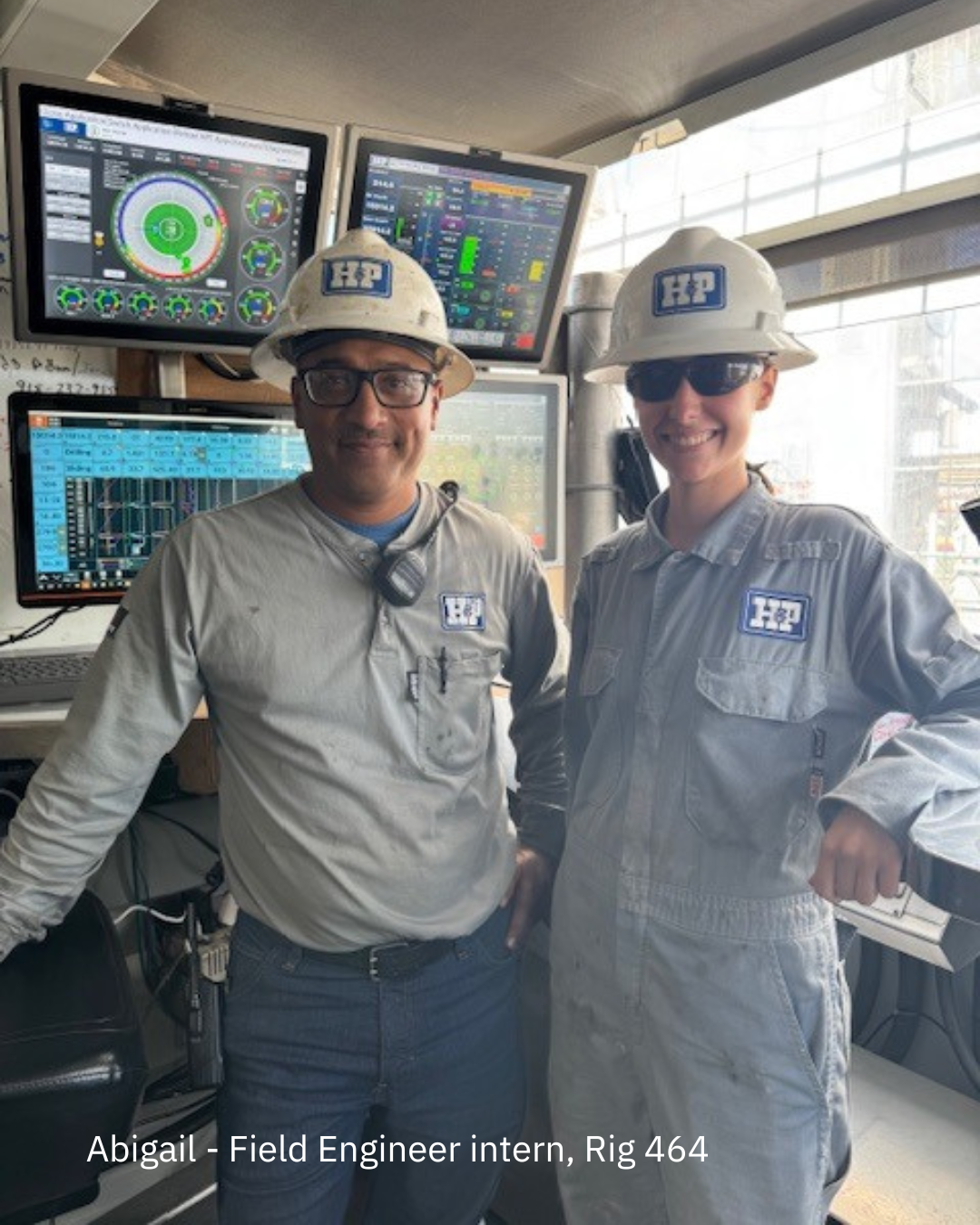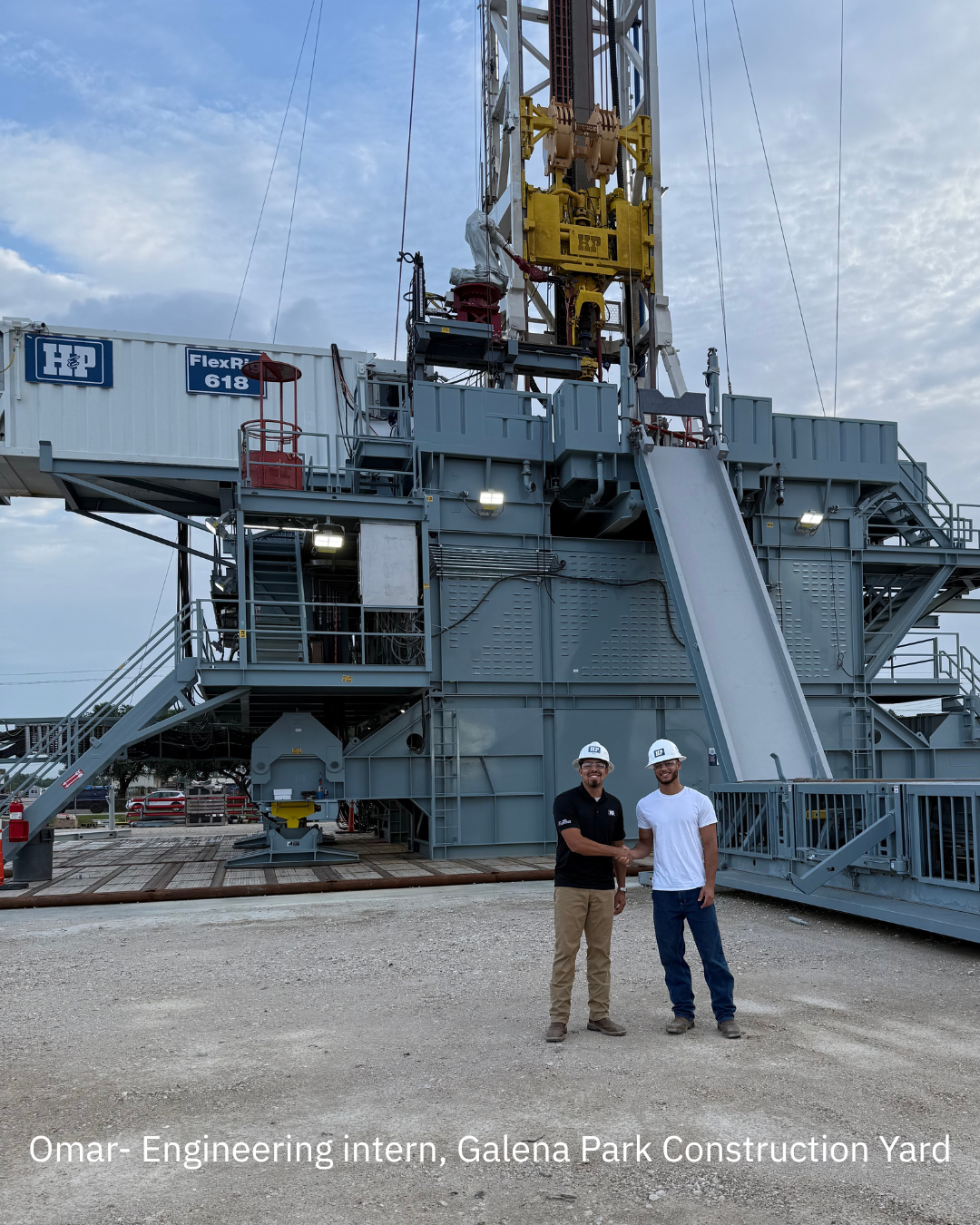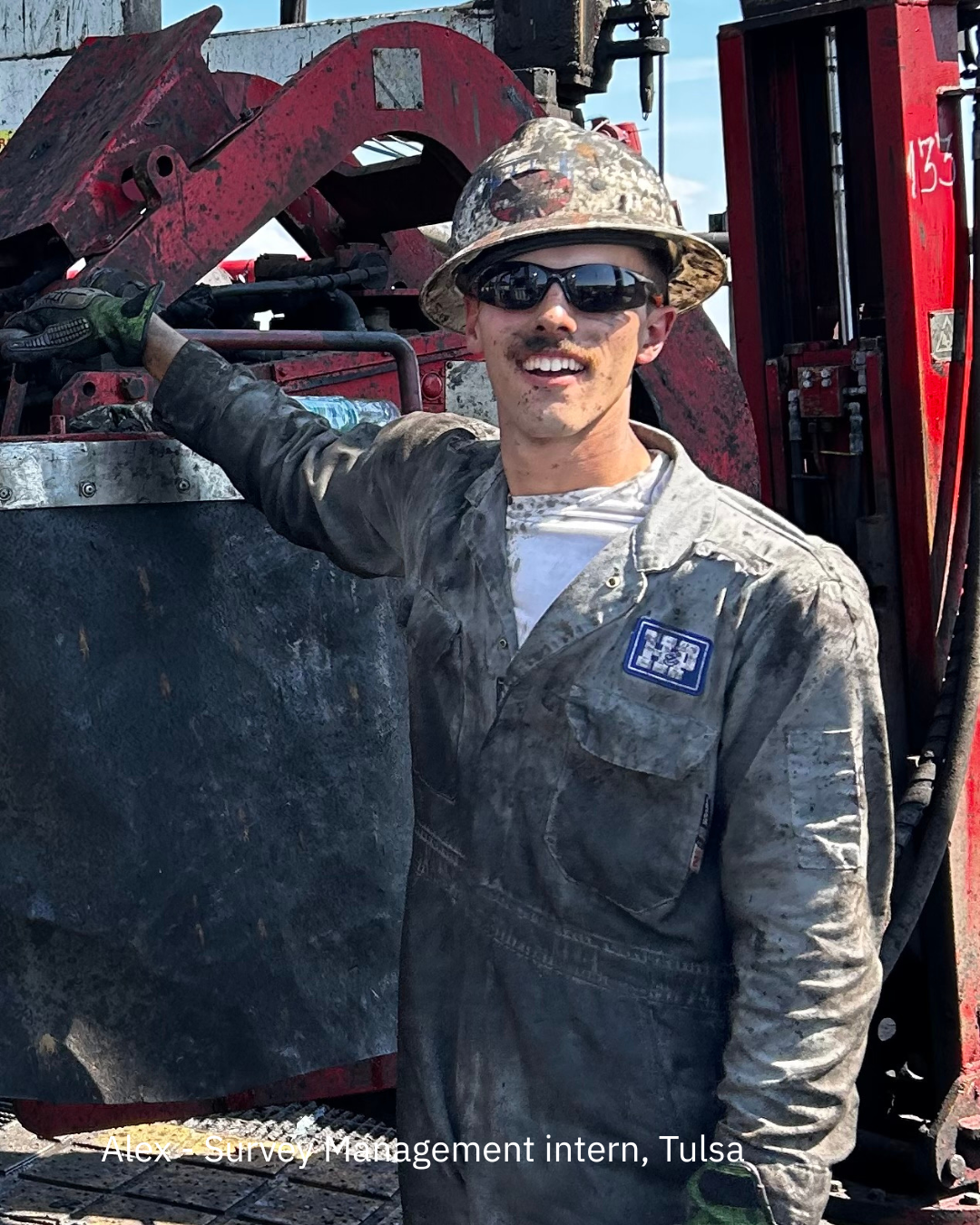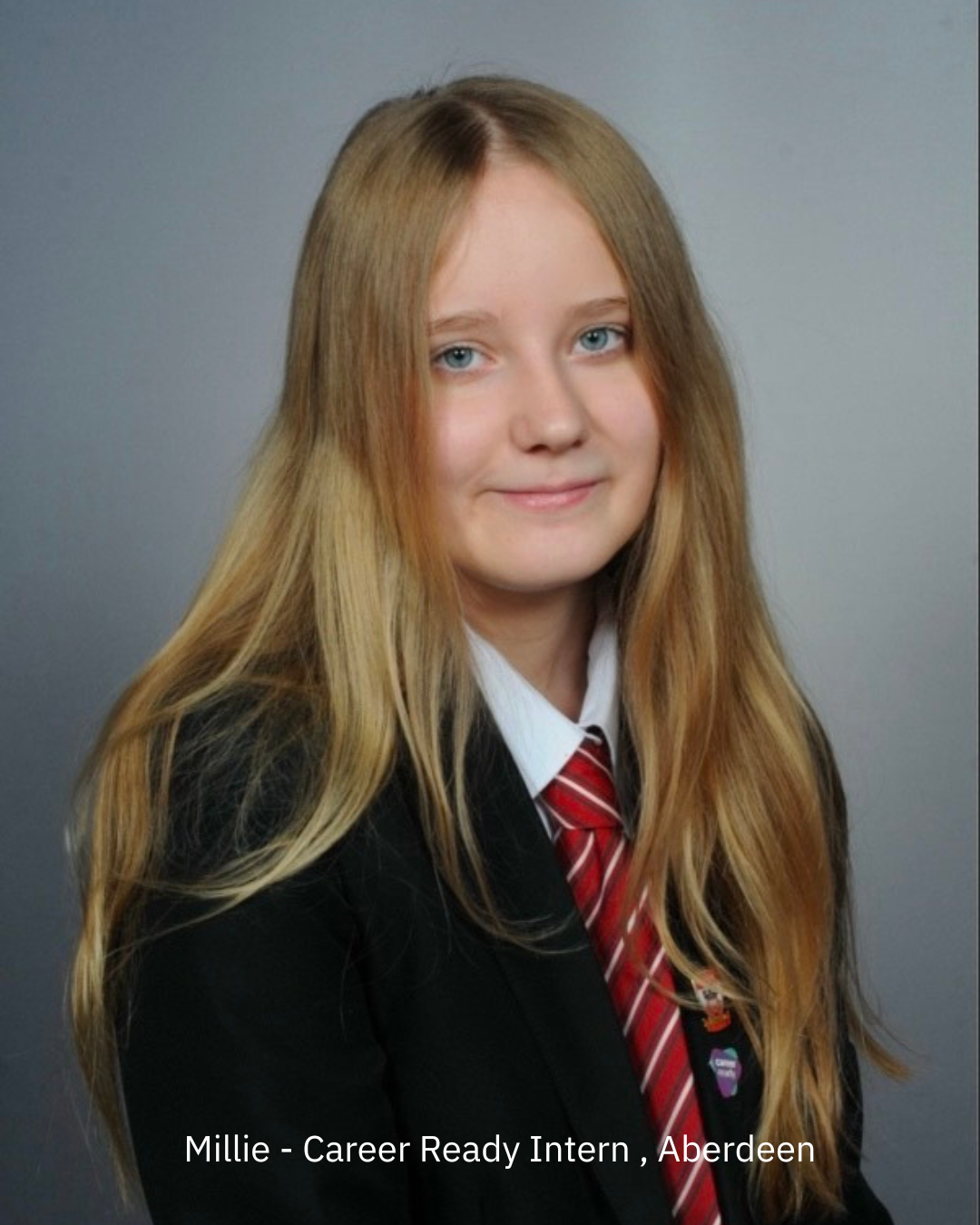This National Intern Day, we want to recognize the hard work and passion our interns have brought to H&P. We asked five interns about five lessons they learned during their internship from different H&P employees. The interns of today are the leaders of tomorrow. Read their insights below.

Abigail Dunaway, Field Engineer Intern on Rig 464
When I first stepped onto Rig 464 as a petroleum engineering student intern, I thought my classroom knowledge had prepared me for what I’d encounter. Two hitches later, I realized that the real education was just beginning. Here are the five most important lessons I learned from the incredible team at H&P.
1. Master the Technical Complexity Beyond the Textbooks
During morning safety meetings, I’d shadow Juan “JC” Gutierrez, our driller, who became my guide into real drilling operations. “Drilling operations are more complex than animated videos show,” Gutierrez explained, demonstrating two-string and three-string drilling based on reservoir type.
As Gutierrez worked, he showed me what to expect on monitors and out the window. When unexpected situations arose, he included me in team discussions about deviations from normal operations. As a petroleum engineering student, I had studied drilling theory, but classroom videos don't show operational complexity.
When I graduate and create drilling plans, I’ll picture Gutierrez in that driller’s chair, monitoring operations and guiding downhole activities. This firsthand knowledge will be foundational to my future work.
2. Navigate Conflict With Facts, Not Emotions
When a third-party vendor’s cement casing leaked after we finished drilling, Clint Paddie, our rig manager, showed masterful crisis leadership. He involved me in discussions with the company man, vendor and team as they navigated the issue.
Paddie kept conversations focused on facts, using language like “the xyz most likely didn’t set” instead of “you didn't install it right.” His approach allowed the third party to acknowledge needed repairs while retaining their integrity. Instead of getting excited and assigning blame, he steered discussions by restating facts, avoiding “you” statements and asking for solutions.
Watching Paddie showed me that relationships can be maintained even after major disruptions, as long as discussions focus on facts rather than personal failures.
3. Use Systematic Problem-Solving Under Pressure
When all three mud pumps failed during drilling, Isaac Lopez, our derrickhand, guided me through crisis management. He included me in every step: showing observations, team discussions about causes, task assignments and solution implementation.
Because each pump had different problems, we worked through the OODA loop (Observe, Orient, Decide, Act) multiple times. The team stayed focused on safety while implementing corrective actions, including a creative solution involving ice buckets and a tarp.
I had studied the OODA loop in class, but seeing it executed under pressure made the decision-making speed sink in. Lopez’s coordination and the team’s persistence showed how systematic thinking returns operations to normal safely and quickly.
4. Look Beyond Tasks to Learn Team Dynamics
Gloria Lee, a project engineer from NAS Engineering Support, became my “Intern Ambassador” after my interview. She advised me to “actively look for opportunities to learn more than just specific job tasks” and to “focus on both technical work and team collaboration.”
Following her advice, I learned that rig operations require constant communication, trust and clear decision-making hierarchy. I observed how H&P team members respect each other, value personal experience and support one another for team success.
Gloria's guidance led me to look beyond technical knowledge and learn something I'll carry forward: the importance of leading from a place of respect for each person, making teams more cohesive and successful.
5. Embrace Core Values as Daily Practice
Oscar “BB” Hernandez, my designated mentor and motorhand, showed me that H&P’s Actively C.A.R.E. core value is more than words on a hard hat — it’s ingrained in how the team works so everyone goes home safely.
On my first day, Hernandez introduced me to the team and reviewed my PPE, making clear that H&P wants everyone safe. During a heat wave, he checked on people, reminding them to stay hydrated and take breaks. When a crew member couldn't break because work was busy, Hernandez finished his tasks then relieved him for an air conditioning break.
Jorge “Cricket” Rocha, another derrickhand, reinforced this lesson by dedicating time teaching me various duties while emphasizing that each job is vital, and every team member’s work is valued equally. When I ask H&P employees why they like working there, they say, “it’s the people,” and that’s evident in how they care for each other.
As I prepare to graduate and enter the petroleum engineering field, these lessons will guide my career. The technical knowledge, leadership principles and problem-solving frameworks I experienced will inform my future work. But perhaps most importantly, I learned that success in this industry isn’t just about understanding technical aspects — it’s about understanding and respecting the people who make operations possible.
The team on Rig 464 didn’t just teach me about drilling; they showed me what it means to be part of a group that genuinely cares about each other’s success and safety. That’s a lesson no textbook can teach, and it's one I’ll carry throughout my career.
Omar Elsousi, Engineer Intern at Galena Park

My time at H&P’s Galena Park facility opened my eyes to the realities of engineering beyond the classroom. Through conversations with supervisors, managers and directors, I learned principles that will guide my career long after graduation. Here are the five most impactful lessons from my internship.
1. Never Assume. Always Verify. Be Right.
During my first few days at Galena Park, Joseph Silva, supervisor in fabrication, shared insights from his field experience. He emphasized three key principles that aren't just workplace guidelines but life habits: never assume, always verify and be right.
Silva explained that these principles can be applied in every aspect of life, not just work. Now, whenever someone asks me a question — whether I’m confident in my answer or not — I make it a point to say, “Let me verify.”
By committing to verification instead of relying on assumptions, I ensure accuracy and build trust. This mindset has extended beyond work, influencing how I approach everyday situations. The goal is to be right, and this lesson has given me a practical way to achieve that.
2. Design for the People Who Use It
While touring the facility and visiting workshops, I asked Marco Guzman, a construction supervisor, about skids and rig components. His advice stood out: “Whenever you build something, you have to think about the people on the field and the people doing maintenance on it.”
From an engineering perspective, it’s easy to focus solely on theory and functionality. However, Guzman’s advice reminded me of practical reality — designs don’t just need to work on paper; they need to work for people who interact with them daily.
A great engineer isn’t just someone who creates functional designs, but someone who considers usability, accessibility and long-term maintenance. This insight will continue to guide how I approach design moving forward.
3. Embrace Change as Growth
During a casual conversation with Craigan Wild, director of FlexRig engineering and construction, about his H&P experience, he shared a simple but powerful statement: “Change is always good.”
This lesson resonated because it applies to both professional growth and personal development. The biggest takeaway is the importance of being open-minded and embracing change as it comes.
For example, I’ve never been the best note-taker, but now I carry a small notebook wherever I go around the facility, documenting valuable information. In the past, I might have told myself I didn’t need notes — that I could remember everything. But now I see the value in adapting and improving habits. This shift in mindset has already made a difference.
4. Stay Hungry to Learn
While reviewing a design I created for the fabrication shop with Javier Resendez, a manufacturing engineering supervisor, we made several revisions to my bill of materials. During our discussion, he offered valuable advice: when I eventually go into the field, I should always be willing to learn.
From day one at Galena Park, I made it my goal to learn as much as possible. Hearing this advice from Resendez reinforced that mindset and made me more eager to take on new learning opportunities.
This perspective helps me view challenges not with frustration, but with enthusiasm — knowing that even difficult tasks are opportunities to grow. I’ll carry this lesson throughout my career, using it to maintain a positive and open-minded approach to learning.
5. Listen With an Open Mind
During a conversation with Alan Belzeski, senior manager of construction and assembly, I asked about daily meetings at Galena Park and how communication plays a role in rig construction and assembly. One key takeaway stood out: always listen.
Listening is essential not just in the workplace, but in every collaborative environment. Whether I’m working on a future engineering project or a group assignment at school, it’s important to listen — especially with an open mind.
Even if I believe I have the right answer, hearing other perspectives can lead to stronger outcomes. Two different ideas might combine into something even better, but that can only happen if everyone is willing to truly listen. Belzeski’s advice reminded me that active listening builds a healthy, respectful and innovative team environment.
Alex Posey, Survey Management Intern in Tulsa
My summer as a field intern last year taught me more than technical skills — it showed me the human side of a complex business. Through mentors across different roles and departments, I learned principles that will guide my career long after this internship in survey management ends. Here are the five most impactful lessons from my time in the field.

1. Hard Work Opens Doors to Learning
Toward the end of an especially rough day during my second hitch, Cole Barker, a derrickhand on Rig 471, told me: “You may not have experience, but you work pretty hard, that counts for a lot.” After that conversation, Cole took time to explain how rig systems operate and how a rotating head is assembled.
The drilling industry is complicated, but hard work is a simple message that resonates across all levels. Barker’s willingness to teach me after recognizing my effort showed me that hard work is the requirement to get extra learning opportunities.
I now understand that hard work opens doors for hands-on learning that will pay dividends down the road. Experience may be valuable, but demonstrating work ethic creates opportunities to gain that experience.
2. Time Spent on People Is Time Well Spent
When I was starting out this summer, Chad Wathen, operations engineering manager for survey management and digital operations support, was more than willing to hop on a Teams call to clear up any problems I was having or to make sure I understood complicated survey concepts. I’ve also seen him do this in meetings, offering to have calls with anyone having trouble with a process or needing guidance.
Wathen’s approach showed me that a team doesn’t truly succeed unless everyone is on the same page in both understanding what’s happening and developing competencies. No time spent teaching a coworker or clearing up a sticking point is ever wasted — that’s how a group improves.
This lesson has reinforced my belief that investing in people is investing in team success.
3. Questions and Feedback Drive Growth
During my first week shadowing Drew Wegener, a remote operations engineer in survey management, he had no hesitation answering any questions I had. Even if the question was way out there or super specific, he would answer it or find out to the best of his ability. He also takes time out of his day to look over anything I ask him to, whether it’s my summer project or day-to-day material.
Wegener’s openness to questions and feedback showed me how we all grow and develop ourselves as well as our work. His willingness to engage with my curiosity, no matter how basic or complex the question, created a learning environment where I felt comfortable exploring ideas.
This has helped me use both feedback and questions together to better refine and improve my work with input from others. I consistently try to get as much feedback as possible to improve.
4. Know Your Starting Point to Grow
Both Hussam Zahir and Maxwell Tello, remote operations engineers in survey management, took time to listen to my previous career experience. After acknowledging what I understood, they expanded on that foundation to explain what I needed to know based on that groundwork. This approach helped me relate what I already knew to what I was currently learning, achieving a better learning outcome overall.
Understanding where you’re starting is a prerequisite to growing. Rather than treating me as a blank slate, they built on my existing knowledge to accelerate my learning process.
When trying to learn something new in my career, I now strive to relate it to previous knowledge to grow what I know instead of starting from scratch. This approach makes learning more efficient and sustainable.
5. Plans Change, and That’s Okay
I was originally supposed to be based in Denver, but due to office renovations, I was relocated to Tulsa. Throughout this process, Alexander Piskin, senior operations engineering manager for operations enablement, has been a stellar manager ensuring that I have everything I need to succeed, whether that’s software, training or general guidance on my work.
Piskin’s handling of this situation taught me that sometimes plans change, and that’s okay — we just have to adapt. His focus remained on my success regardless of the changed circumstances.
I now truly understand that the best laid plans sometimes change. The best practice is to accept that the plan will change and do your best to do the right thing for the new plan. Flexibility and adaptability are essential professional skills.
Kaylee Russo, Technology Intern in Tulsa
As a returning intern my time at H&P has taught me more than technical skills — it has shown me the human side of professional growth. Through mentors across different roles and departments, I have learned principles that will guide my career long after this internship ends. Here are the five most impactful lessons from my professional development journey this summer.

1. Embrace Growth Beyond Your Role
During a mid-summer intern check-in, Don Kerr, manager of application development, told me: “Always be open to trying new things — even if they are outside your comfort zone or not part of your daily responsibilities. You never know how these new skills might benefit you in the future.”
The technology industry is complex, but intellectual curiosity is a simple message that resonates across all levels. Kerr’s encouragement to seek learning opportunities outside my team’s immediate priorities showed me that job titles should not limit our potential for growth.
I now understand that being open to new experiences creates opportunities for skill development that will pay dividends down the road. Expertise may be valuable, but demonstrating curiosity creates opportunities to gain that expertise.
2. Choose Your Path Authentically
When I was feeling uncertain about my post-graduation direction last summer, Carter Todd, senior manager of IT business solutions, was more than willing to hop on a call to discuss my options. He told me: “Whether you go for an MBA or a master’s in business analytics depends on what motivates you and where you see yourself growing. The important thing is choosing the path that feels right for you.”
Todd’s approach showed me that educational and career decisions should be driven by personal motivation rather than external expectations. No time spent reflecting on authentic career goals is ever wasted — that's how professionals find fulfillment.
This lesson has reinforced my belief that investing in self-reflection is investing in long-term career success.
3. Maintain High Standards While Practicing Self-Compassion
During my time working with Luu Tran, principal software engineer in application development, he consistently encouraged me to deliver my best work while reminding me: “Always give your best but remember that it's okay to not have all the answers right away.”
Tran’s balance of high expectations and understanding showed me how we all grow and develop ourselves as well as our work. His willingness to challenge me while creating a supportive environment where I felt comfortable seeking guidance created optimal conditions for learning.
This has helped me use both effort and patience together to better approach challenges with a sustainable mindset. I consistently strive to deliver quality work while being kind to myself during the learning process.
4. Proactive Communication Drives Success
Austin Pearson, software engineer II in application development, took time to create an environment where questions were welcomed. At the end of every Teams call, he would tell me: “If you need help, whether you’re stuck on a blocker or have a question you need answered, don’t hesitate to reach out.”
Understanding that communication is essential is a prerequisite to professional growth. Rather than treating questions as weaknesses, he built on my willingness to ask for help to accelerate my learning process.
When facing challenges in my career, I now strive to reach out proactively rather than struggling alone. This approach makes problem-solving more efficient and collaborative.
5. Nurture Your Current Environment
During a Tulsa Women of H&P Connection volunteer event this summer, Makenna Mittelstet, talent management partner II in talent acquisition and talent management, shared valuable perspective about career development. She told me, “Sometimes the grass looks greener elsewhere, but often, it just needs a little care and attention right where you are.”
Mittelstet’s wisdom about this situation taught me that sometimes satisfaction comes from investing in your current environment rather than constantly seeking external opportunities. Her focus remained on recognizing potential in existing circumstances.
I now truly understand that the best career moves sometimes involve deepening current commitments. The best practice is to consider how you can grow within your present situation while remaining open to new possibilities. Thoughtful career development and authentic growth are essential professional skills.
Millie Hamill, Career Ready Intern in Aberdeen
My time as an intern has taught me more than technical skills — it has shown me the human side of professional development. Through mentors across different roles and departments, I have learned principles that will guide my career long after this internship ends. Here are the five most impactful lessons from my professional journey.

1. Curiosity Opens Doors to New Possibilities
During our work together, Nicola Davidson, Head of SAP , told me, “Always try new things.” Before working with her, I was hesitant to explore areas like SAP and spreadsheets, having convinced myself that I wasn’t good at them.
The business world is complex, but embracing curiosity is a simple message that resonates across all levels. Davidson’s gentle encouragement to give unfamiliar tasks a try showed me that even if something isn’t for me, the experience itself would be valuable.
I now understand that stepping outside my comfort zone creates opportunities for growth that will pay dividends down the road. Expertise may be valuable, but demonstrating willingness to learn creates opportunities to gain that expertise.
2. Follow Your Passion Authentically
During conversations with Lisa Barclay, communications manager, and Linzi Punton, Eastern Hemisphere group head of communications, they consistently encouraged me to trust my instincts. When I expressed concerns about pursuing my passion for English, worried it might not lead to a meaningful career, they told me, “Do what your heart tells you to.”
Their collective wisdom showed me how authentic career decisions drive long-term satisfaction and success. Their willingness to validate my interests, no matter how uncertain I felt about the practical outcomes, created an environment where I felt comfortable exploring my true calling.
This has helped me use both passion and practicality together to better navigate career decisions with confidence from mentors. I consistently try to align my choices with what genuinely excites me while remaining open to unexpected opportunities.
3. Proactive Engagement Drives Understanding
David Grant, SAP Cloud Center of Excellence (CCoE) lead, took time to assign me a task that required reaching out to different team members. When I expressed hesitation about initiating conversations with people I hadn’t met before, he encouraged me by saying: “Get out there!”
Understanding that networking and relationship-building are essential is a prerequisite to professional growth. Rather than treating my hesitation as a limitation, he built on my willingness to learn to accelerate my integration into the workplace.
When facing unfamiliar situations in my career, I now strive to be proactive rather than waiting for opportunities to come to me. This approach makes learning more efficient and collaborative.
4. Seeking Help Shows Strength
During a spontaneous conversation after a meeting, Conor Stewart, HR service center senior administrator, shared valuable perspective about workplace dynamics. When I admitted feeling overwhelmed by the professional environment and hesitant to ask questions, he told me: “Ask for help if you need help.”
Stewart’s wisdom about this situation taught me that asking questions isn't a sign of weakness but a way to grow and do your job well. His focus remained on normalizing the importance of seeking clarification when needed.
I now truly understand that everyone asks questions to do their best work. The best practice is to reach out when you need support rather than struggling alone. Open communication and willingness to learn are essential professional skills.

